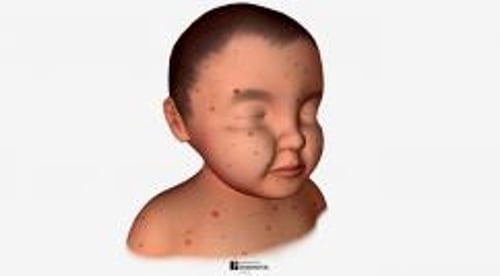What is chickenpox?
Chickenpox is a viral infection that's more common in children than in adults.
Chickenpox causes fever and an itchy rash of small, raised blisters or crusted spots
Chickenpox spreads easily from person to person
Chickenpox usually isn’t serious in healthy children—they almost always get better with no problems
In people with a weak immune system, chickenpox may be severe and life-threatening
Even after you get better, the chickenpox virus remains in your body
Years after you recover from chickenpox, the same virus can cause shingles, a painful rash of fluid-filled blisters
The chickenpox vaccine can prevent chickenpox
What causes chickenpox?
Chickenpox is caused by the varicella-zoster virus.
The virus spreads:
Through the air, from droplets an infected person coughs or sneezes
Through touching chickenpox blisters
After you get over chickenpox, the virus stays in your body. It stays in nerve roots, near your spine. Sometimes the virus becomes active again and causes a rash (shingles) on the part of your skin connected to the infected nerve root.
What are the symptoms of chickenpox?
The first symptoms are:
Fever
Headache
Feeling tired, sick, and not hungry
About 1 to 2 days after symptoms start, the rash appears. The following happens:
At first, the rash consists of small, flat, red spots
Within 6 to 8 hours, each spot becomes raised, and an itchy, round, fluid-filled blister forms
Usually, the rash starts on your face and chest, then spreads to your arms and legs
You may have only a few spots or you may get them all over your whole body, including inside your mouth, vagina, and rectum
Usually, you stop getting blisters after about 5 days
Most blisters crust over within about 6 days and usually disappear in less than 20 days
People with chickenpox are most contagious (likely to spread the sickness to others) at the beginning of the illness, but they can continue to spread it until all their blisters crust over.
Sometimes, people get brain, lung, or heart infections from chickenpox. Pregnant women and people with a weak immune system are at risk for serious problems from chickenpox.
How do doctors tell if I have chickenpox?
Doctors can tell you have chickenpox from your symptoms and rash.
How do doctors treat chickenpox?
Chickenpox usually gets better without treatment. To feel more comfortable:
Put cool, wet washcloths on the rash to help soothe itching
Bathe often with soap and water to stop bacteria from infecting the blisters
Clip fingernails to prevent scratching, because scratching can cause scars and open the blisters to let bacteria in
Take antihistamine medicine to lessen itching
If the blisters get infected with bacteria, you may need an antibiotic.
Doctors may give antiviral medicines to children and adults at risk for having severe chickenpox. These medicines help lessen chickenpox symptoms and make them go away faster. Antiviral medicines work only if you take them within 24 hours of the start of symptoms.
How can I prevent chickenpox?
You can keep chickenpox from spreading to other people by:
Getting the chickenpox vaccine
Not going near someone who has chickenpox (if you’ve never had chickenpox)
Keeping children home from school until all blisters have crusted
For adults, staying home from work until all blisters have crusted
Vaccines are shots that healthy children and adults need to help protect them from certain infections. In the United States, children get their first chickenpox shot when they are 12 to 15 months old and a second chickenpox shot when they are 4 to 6 years old. Most people who get the chickenpox vaccine will never get chickenpox. If someone who has gotten the vaccine does get chickenpox, it's usually very mild.




